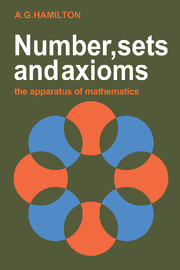Summary
The mathematician's work proceeds in two directions: outwards and inwards. Mathematical research is constantly seeking to pursue consequences of earlier work and to postulate new sorts of entities, seeking to demonstrate that they have consistent and useful properties. And on the other hand, part of mathematics consists of introspection, of a process backwards in the logical sequence, of the study of the nature and the basis of the subject itself. This inward-looking part is what is normally called the foundations of mathematics, and it includes study of set theory, the number systems, (at least some) mathematical logic, and the history and philosophy of mathematics. This book is not intended to cover all of these areas comprehensively. It is intended to convey an impression of what the foundations of mathematics are, and to contain accessible information about the fundamental conceptual and formal apparatus that the present-day working mathematician relies upon. (This apt description is due to G. T. Kneebone.) The concepts directly involved are: numbers (the various number systems), sets, orderings of sets, abstract mathematical structures, axiomatic systems, and cardinal and ordinal numbers.
The book presupposes no knowledge of mathematical logic. It does presuppose a certain amount of experience with mathematical ideas, in particular the algebra of sets and the beginnings of mathematical analysis and abstract algebra. Its structure is in many ways a compromise between what is appropriate for a course text and what is appropriate for a more readable background text.
Information
- Type
- Chapter
- Information
- Numbers, Sets and AxiomsThe Apparatus of Mathematics, pp. vii - xPublisher: Cambridge University PressPrint publication year: 1983
